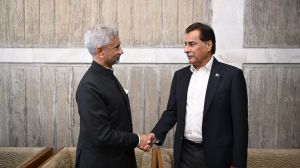A deeper peace
All contenders in Pakistan polls promise enhanced peace-making with India. Delhi must build on it
All contenders in Pakistan polls promise enhanced peace-making with India. Delhi must build on it
Like the public carriers that ply its roads,Pakistans politics has always been attractively colourful. But far too often in its many phases of democratic rule,political combat has tended to be more of a distraction,a clash of powerful leaders and clans,that reinforced the impression that the real power resided elsewhere,primarily with the powerful military. In the run-up to the historic May 11 election,Pakistans first transfer of power from one popularly elected government to another,a change may be visible. And it is one for which Pakistanis must be complimented. It is not just that the two largest parties these past five years committed themselves to firewalling political contestation within the framework of parliamentary procedures and staving off any instability that the army could have exploited,a landmark in itself for Pakistan. There is also the deepening of election-time conversation between the politicians and voters that has marked a campaign otherwise conducted in the shadow of the terrorist threat.
The case for representative democracy is,of course,not yet comprehensively won in Pakistan. The possibility of military takeover stands vastly reduced but it has not disappeared. Policymaking is still not the preserve of the elected government alone,with foreign policy and security being the preserve of the military,conducted both directly and by proxy. But those invested in seeing greater prosperity and tranquility in Pakistan as India necessarily is should take note of the changed dynamic in civil society there. The aspirations are evident in the manifestos of the main contenders for power. The PPP,PML which is expected to emerge as the largest parliamentary bloc and PTI Imran Khans party,seen to be tolerant of the Taliban minus the violence all promise enhanced trade and peace-making with India.
The window for Indias establishment to respond is narrow,given our own electoral calendar. Delhi needs to not just work purposefully with the new government in Islamabad to forge deeper bilateral engagement,it also needs to act more visibly upon the perceived popular sentiment in Pakistan that the political parties are responding to. India has been far too sporadic and reticent in reaching out to diverse sections of Pakistani society in order to alter perceptions,and also to demonstrably pursue tracks to further their aspirations in a collective manner. Being more articulate on the redlines on,say,terrorism and shedding pointless insistence on reciprocity on,say,people-to-people contact,would be a mutually beneficial game-changer. It would,for instance,counsel a more proportionate response to crises like the one provoked by the tragic assault on Sarabjit Singh.
- 01
- 02
- 03
- 04
- 05































